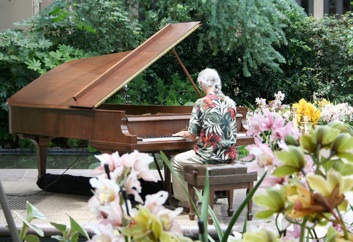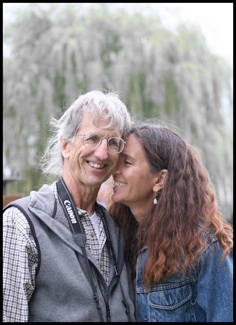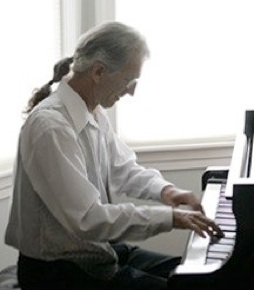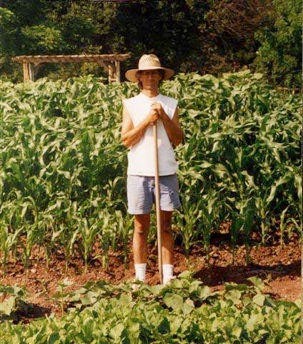Greg Maroney has been one of my favorite artists since I was asked to review his 2002 CD, “Sentinel.” He recently released his seventh album, “The Garden Gate,” which contains some of his best work yet. Over the past several years, I’ve worked with Greg to get his most popular pieces into sheet music form, and I feel very privileged to be able to know his music in such an intimate way. Much of Greg’s music reflects his natural surroundings, and he is equally adept at conveying a delicate breeze or a raging storm. Greg is a wonderful composer/pianist, a trauma nurse, and a gentleman farmer, so enjoy getting a glimpse into his world! We did our first interview back in 2005, so it seemed like a great time to do an update. The older interview is also on this site.
KP: It’s hard to believe it’s been more than three years since we last did an interview! Tell me everything that has happened to you since November 2005. (Kidding!)
Maroney: Hi Kathy. It IS hard to believe that it has been so long. Time flies like the wind. My wife and I just celebrated our 20th wedding anniversary, and we are also wondering where the time went. But, I must say I have been busy with music, the garden and fixing up our old farmhouse. I have released two CDs since the last interview, “Seven Valleys,” and the most recent CD “The Garden Gate.” I have also been transcribing the songs into sheet music, and recently finished a complete transcription of “The Garden Gate.” Having you proof all the scores has been invaluable - it really makes the music solid and playable. If it passes your red pen, I know it’s ready!
KP: That’s great, and I always thoroughly enjoy working on your music! Love it! Let’s talk about your new CD, “The Garden Gate.”
Maroney: The new CD comes out of our land and our life here in rural south central Pennsylvania. We have a small farm with a large vegetable and flower garden that we tend. Not only does the land provide us with wholesome food, but the pure act of nurturing the earth and having green plants grow that sustain us is truly a wonderful thing. It nourishes our souls. I tried to capture that feeling in the music for this CD.
KP: Where did the title come from?
Maroney: The title came from the piece “The Garden Gate,” which is about walking up to a garden gate and peering beyond it to all the green, lush plants that are on the other side. What magic lies beyond? What mystery lies beyond this gate? Life? Adventure? Love?
KP: I know that some of your earlier recordings were done digitally on your home MIDI grand and then sent off to a studio with a MIDI concert grand for mastering. Is that what you did this time?
Maroney: Well, it’s a long story. I did have a Yamaha C6 Disklavier. It certainly took the anxiety out of recording in a studio. I could play the song in my home studio, capture the MIDI data, do some slight editing with a MIDI program, and then send the finished disk to LA where a great technician who has a Yamaha CFIII Disklavier Pro would insert the disk and run it through in straight time to record the album. It cut the cost of the studio to about a third of what it normally is to record a whole album. But I recently sold that piano and purchased a Yamaha CS, which is an 8’2” grand. It has a beautiful tone and great action. We spent about a week recording the new album, but at the final cut I did not like the way it sounded. At the risk of getting too technical, the attack of the hammers was too harsh and sharp, and there were overtones that I did not find pleasant. It just did not sound right for the music in this album. I decided I needed to change the hammers to a softer felt, but did not really want to wait for that to happen before I recorded the album. I was ready! So on to plan B. I found a recording studio about an hour’s drive from my house, Schoolhouse Productions in Reading, Pennsylvania. The recording engineer is Marty Mellinger, an incredible musician who has a wonderful Yamaha CFIII 9 foot concert grand. The piano has a nice round, rich tone. He gave great advice and encouraged me to play with deep emotion and a clean sound. He really pushed me! I was happy with the end result, and we released the CD a couple of weeks ago.
KP: Is working in the garden still a big part of your life?
Maroney: It is a big part of my life. Not only do we get good food from it (strawberries are just in now), but I love being out in the open air around green growing things. The plants have no other agenda, and if you give them a little water, compost and sunlight, they grow. I am also a trauma nurse, which can get a little, shall I say, exciting? And, I see my share of tragedy. Just being in the garden is tremendously soothing and washes me clean from the inside. Music also does that.
KP: Let’s talk about some of the songs on the new CD. What inspired you to compose “Rolling Joy”?
Maroney: “Rolling Joy” is a fun song. It is happy, and just “rolls” along. Coming up with names is always challenging, so I just took what I had in mind when I composed it. I think it expresses a jaunty, happy, walk. It rolls on down the path. It’s a great piece to open a concert with.
KP: How about “Crescent Moon”?
Maroney: This song has its roots in the twilight time, with the deep Persian blue sky, a crescent moon and a nearby twinkling star, perhaps Venus. Occasionally you see a sunset that is stunningly beautiful and makes you go “wow!” This is about the delightful moment when the day is finished and the night sky is starting to take over. A sliver of moon is coming out just over the horizon, and stars are starting to appear. A very magical time of the day!
KP: And “Tundra Swan”?
Maroney: When I started composing this piece, I was imagining the cold. Cold snow, cold sharp air, ice, frost, frozen lakes. We must have been having an exceptionally cold winter! Winter has a very stark beauty, very shimmering and sparkling. But on the other hand, the cold can be deadly if you are not prepared. The tundra swan lives in that kind of environment, and I thought the title would be a good representative of what I was trying to express in the composition.
KP: What inspired you to do another version of “Sanctuary Medley”?
Maroney: That’s a good question! After I initially recorded the piece for the CD “Wind Chimes,” I discovered that the wonderful little song “Simple Gifts” fit very well within the structure of the composition. I had been playing it that way for some time, using it as either the finale or encore piece. People have been asking for it to be recorded, so now it is!
KP: It’s so joyful and a lot of fun to play as well as to listen to! The last time we spoke, you said that performing was still making you very nervous. Now that you’ve played in numerous concerts with Whisperings Solo Piano Radio, do you still get nervous?
Maroney: Not as much as before. Performing frequently in solo concerts plus Whisperings concerts has been a real help. The first solo concert I gave, oh, probably ten years ago, I was nervous for a week prior to the performance date. I just did not know what to expect. Now, I have developed more confidence and realize that the world will not come to an end if I make an error. I just keep going through the mistake, or improvise until I find the song again. Or perhaps I can’t find the song, so I improvise and make a new one. Being the composer has its advantages! If you really look at composing, the process is all one big improvisation that eventually becomes solidified into a “piece” that you can write down.
But, interestingly, my songs seem to change over time, so how I played a piece at a concert last year may not be what I play this year. The songs seem to have a life of their own, and they evolve and grow. It’s often through “mistakes” that they change. Most mistakes sound bad and get thrown out, but occasionally you make one that really sounds good. If you can catch it, you can incorporate it into the fabric of the song. You really should not be afraid of mistakes!
KP: Do you find it less stressful to play with two or three other pianists rather than playing a solo concert?
Maroney: It’s great to perform with a few other people for a couple of reasons. First, it is wonderful to meet other pianists that are going through the same changes that I am. For example, we can talk about how well CD sales are going, discuss performance tips, what the economy is doing to our careers (both good and bad!), and give each other composing tips. It’s great to see how other pianists are coping with the problems and joys that I face on a day-to-day basis. Secondly, I do not have to carry the entire weight of the concert. It’s a fairly big memory load to have fourteen or fifteen songs ready in my fingers. I do have that on hand - I can play for a two-hour concert - but it’s nice to not have to stress about it and to just have fun playing four or five pieces very well.
KP: Did you find playing on the same bill as David Lanz daunting? He’s such a nice guy, but he is “da man”!!!
Maroney: It was a wonderful experience playing with David Lanz, and yes, it was daunting. He is a master at performing and composing, but he did not put on any airs, and just played with all his heart. I learned an incredible amount about performance from him. I also find it pushes me to perform with Michael Dulin, who is such an exquisite pianist. Technically and aesthetically, not many come close to his abilities.
KP: I couldn’t agree more! Both David and Michael are good friends of mine, but I don’t think I could play for either one of them without having a major panic attack! A dream concert for me would be you, Michael Dulin, and David Lanz. I know the three of you have played together, but I think those performances were all on the east coast. How about bringing it west?
Maroney: This would be my dream concert also! They are two of the best pianists I know, and it always challenges me to play better just to keep up with them. I would love to play a concert with them again. Of course I would travel to the West Coast!
KP: I’ll hold you to that! Are you still taking piano lessons?
Maroney: I have had piano lessons in one form or another all my life. I did take formal lessons until quite recently - about two years ago. I have also studied voice with a master vocalist from India and as well as study few of the instruments of the Middle East, such as the Saz and Sitar.
I feel the piano is such a magnificent instrument that it requires a lifetime to learn, and even that is not enough time to master it. There will always be people who know more than I do about performance and technique, and it is certainly in my best interest to continue to learn from them. Plus, it gives me fresh ideas as I hear new music and discover new ways of playing. I would advise all flourishing pianists to find a mentor and keep learning. Be a life-long learner!
KP: Didn’t you have a few students a while back? Are you still teaching?
Maroney: I have recently stopped teaching; there just is not enough time in the day. I love it, though, and had fun with the students. It was great teaching them the basics, but I tried to not confine them to only classical or jazz. I gave them the groundwork and structure to make music that was their own. I think they enjoyed that approach - it was a bit freer.
KP: Another radical piano teacher! I love it! I would imagine that a lot of people are surprised to know that you’re a trauma nurse. How long have you worked in the medical field?
Maroney: This is my other passion. I have been in emergency medicine in one form or another for forty years. I’m still working in it, and have become an expert in triage. I was a paramedic for twenty years, a trauma nurse for about five years, and now I have put all that expertise to work to help develop an emergency triage program at the hospital I work at in south central Pennsylvania. It’s an adrenalin rush, but certainly valuable work. That steady paycheck also pays the bills!
KP: Composing, gardening, and working with medical emergencies seem so different from each other. How do you incorporate them all into a day without going crazy?
Maroney: They are pretty different. I don’t really mix the hospital with the piano. I suppose I have been working in emergency medicine for so long that when I walk out the door at the end of a shift, most of the time everything falls away. I work the evening shift, so I basically go to sleep and wake the next morning ready to practice and compose.
KP: We managed to get all of the sheet music from “The Garden Gate” finished {Greg transcribed and Kathy proofed} before the release of the album. Are you going to make that music available in book form or download (or both)? When do you expect it to be ready for people to buy?
Maroney: I definitely will be making the music available. There are a few more things to complete with the release of the CD, such as getting it onto iTunes and onto our website (www.gregmaroney.com). After that, I plan to make the complete transcription of the album available both as a spiral bound book and as a digital download. It was great fun transcribing the complete CD and working closely with you to get the final version of each song. The proofing you did was invaluable! I have other songs written to sheet music, but never a whole album. I think it will complement the CD very well. Pianists can hear the songs as well as see them in written format.
KP: I was talking to a composer friend a week or so ago, and he said that in his marriage, his wife viewed his music almost as a mistress that eventually broke them up. Has that ever been a problem for you?
Maroney: First and foremost, my wife is my loving and faithful companion and the best supporter of my piano business that I could ask for. She actually is partly responsible for my continued attention to composing. But, I must confess she has a tremendous amount of work to do in maintaining the website, selling CDs, taking care of the farm when I am playing out of state, and listening to all that practicing, practicing, practicing - it can drive her crazy. But she is pleased to see my progress, happy when iTunes sends a check, and really loves the music.
I try to make practicing a routine done first thing in the morning, and stick to that fairly closely. Sometimes she would prefer to go out in the garden or have me move mulch for her flower beds, and if I continue practicing, then the piano is the mistress that I prefer over her. But generally she is the best friend I could have and gives me her 100% support.
KP: Since you have music in your head all the time, do you listen to much music for pleasure? If so, what do you like to listen to?
Maroney: I have to say that music does clatter around in this head of mine quite a bit. At times it’s the song I just played on the piano before I go to work outside or in the garden, sometimes a new melody pops into my head as I am weeding or walking. One thing is certain: there is a steady undercurrent of melody in some form churning away upstairs. I do listen to some music, but not a lot. In the car I listen to books on CD. I also listen to the other pianists on Whisperings, and of course some of the pop classics. I also like singer/songwriters. I have recently listened to CDs by Wayne Gratz, Rachel Currera, Louis Landon and Joe Bongiorno, each artist excellent in different ways.
To learn more about Greg, be sure to visit
his website and his
Artist Page on MainlyPiano.com. Also, check out his new CD, “The Garden Gate”!
Kathy Parsons
May 2009




